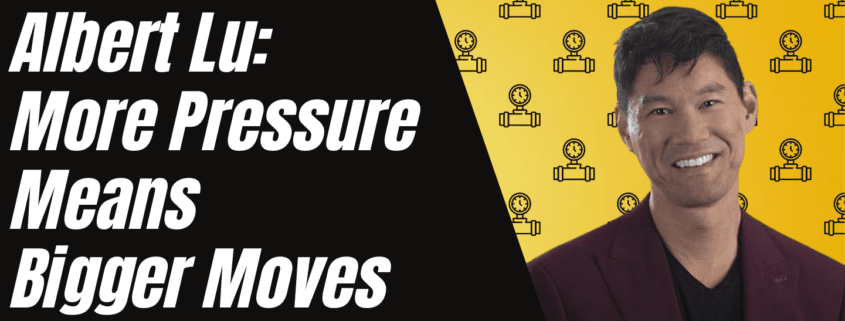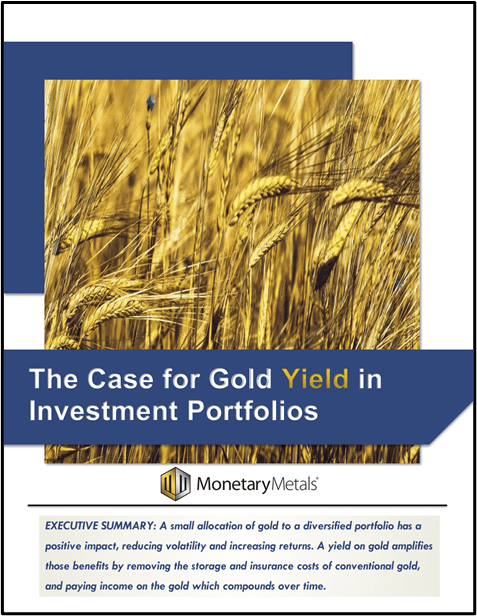Albert Lu: More Pressure Means Bigger Moves
Albert Lu of Luma Financial joins the podcast to discuss market trends in gold, commodities, and more. Albert questions market optimism, gives his thoughts on how rates are impacting different sectors, and where pressure is building for potential explosive upside.
Additional Resources
Earn a yield on gold, paid in gold
The Case for Gold Yield in Investment Portfolios
Podcast Chapters
[00:00:00]: Albert Lu
[00:01:38]: The Bond and Equity Markets
[00:02:53]: Gold’s Performance
[00:03:41]: Silver’s Potential
[00:04:49]: Cryptocurrency Outlook
[00:05:19]: Uranium’s Role in Green Energy
[00:06:07]: Impact of Green Energy Revolution
[00:07:00]: Inflation Concerns
[00:08:20]: Potential Currency Changes
[00:09:14]: Powell’s Position
[00:10:24]: Modern Monetary Theory
[00:11:04]: Bond Improvement
[00:12:00]: Over and Undervalued
[00:14:11]: Who to Read
[00:15:11]: Optimism
[00:15:51]: Luma Finance
[00:16:07]: Yield on Gold
Transcript:
Ben Nadelstein:
Welcome back to The Gold Exchange Podcast. My name is Ben Nadelstein. I’m joined today by Albert Lu. Albert, welcome back.
Albert Lu:
Thank you very much.
Ben Nadelstein:
Albert, quick question for you here. We’ve seen 5% interest rates. A lot of people said there’s no way the economy will be able to survive that. Stocks will fall, unemployment will rise. Yet, we’re looking at a pretty stable stock market and a pretty stable job market. What were most analysts missing?
Speaker 3
I heard Stan Drukenmiller on CNBC just two days ago, and he said, It looks like the bond market has priced in the new interest rate environment, but the equity market hasn’t. I think that just in general, if you look at bond investors versus stock investors, bond investors tend to be very pragmatic in the moment, balance sheets, income statements, so forth. But stock investors, they tend to be more optimistic or at least looking into the future. I think that’s what it is. I think he nailed it. I think the equity markets just haven’t priced in the new reality.
Ben Nadelstein:
As part of that question here, in the negative sense for equities with five and a half % risk-free on treasury’s T-bills, most people at some point are going to say, Why am I throwing more money in stocks when I could get pretty much a risk-free return at five and a half %?
Albert Lu:
Yeah, it’s happening now. Walking around the floor, people talking to me, asking them what they’re doing, a lot of them are saying that. They’ve taken the 5 % on whatever, six months or one year, whatever.
Ben Nadelstein:
Now, a question that arises from that is why is gold doing so well? Most people would say gold has no yield and monetary metals, we do pay yield. But most people say gold has no yield. It’s a shiny pet rock. Why would I buy that when I could get a CD or a money market account paying five and a half %? Are you surprised at how well gold is holding up here?
Albert Lu:
I mean, it’s impressive for sure. If you look at over the last tightening cycle, you would think that that would be bad for gold. I guess relatively it has been. Maybe it would be up more if we weren’t in this environment. But no, people don’t generally, outside of say your product, they don’t look for a yield in gold. They hold it for other reasons. I guess earning the yield on gold is a new concept.
Ben Nadelstein:
Right. I do think a lot of people say, Well, I can earn 5% on dollars right now. Now 5% in gold, I do think is a little bit more attractive, right? Especially when you’re looking 10 years down the line, what will a dollar be worth? But it’s surprising that gold has held up so well, but silver hanging in there as well. Do you think that there’s a different narrative now for gold and silver than there was about about let’s say six months ago?
Albert Lu:
Well, we’re further down the road. And so this behavior is a setup for big moves in gold and silver at some point. Rick Rule was on stage just yesterday, and his big speculation was silver. He said that’s where the big move is coming. If you’re a speculator, you might want to think about that. But I think the longer we go, the more pressure builds, the bigger the move, the more explosive we’re going to have later.
Ben Nadelstein:
Do you think that there’s different angles here? Some people are saying central banks are buying gold. This might be helping support the price. Others are saying that, well, if you’re taking certain losses on your balance sheet, you might be selling gold. There’s pressures in both directions. But silver is usually not an asset that central banks buy. Most people who are buying silver are usually buying in smaller amounts. It’s not a capital asset that trades against other high value assets. Is maybe that why silver has this different narrative to it now?
Albert Lu:
I mean, that’s a good question. It’s not really something that I could tell you for sure. It just tends to be more volatile. It’s the home of speculators. I guess smaller flows of money make a bigger difference in silver. That’s just the way it is.
Ben Nadelstein:
Now let’s talk about smaller flows and another asset class, which is cryptocurrencies. About last year, there was a full craze. People were obsessed with Bitcoin, Ethereum, Dogecoin, all going to the moon. We’ve seen them fall from all-time highs. Do you see that the cryptocurrency phase is over and this hard asset cycle is beginning, or do you think there’s more juice in that crypto squeeze?
Albert Lu:
Okay, so it’s not my expertise at all. I don’t actually trade or hold cryptos. Based on the enthusiasm I see from the people who do, though, I would say it’s not over. Definitely not.
Ben Nadelstein:
Now let’s talk about some other commodities, other metals. There’s been a lot of talk about uranium. Lots of people saying, Well, the only way we’re doing a green energy revolution is through metals, and one of those important metals for nuclear energy will be uranium. Do you see that that narrative is playing out here in this environment?
Albert Lu:
Absolutely is, yeah. Rick Rule called that years ago, and he didn’t just call it. He called a shock. He said how it would happen, and it seems to be playing out exactly the way he said. I talked to him about it recently. He said, look, the easy money has been made on uranium, but the big money is still to come. Still early enough to get in, I think.
Ben Nadelstein:
Now let’s talk a bit about this green energy revolution. There was a lot of talk last year saying we’re going to have solar panels, we’re moving away from fossil fuels, but all of that requires mining and it requires metals. Do you think that this green energy push, is it on pause and the metals are also on pause? Or do you think we’re just waiting for something to happen where those metals go into a different type of cycle? I think.
Albert Lu:
There was a lot of enthusiasm upfront, and you’re seeing that with the EV cars. There was a ton of enthusiasm, and you saw it reflected in the battery metals. You saw it reflected in the price of Tesla shares. Now you’re seeing it come off. You’re seeing the car companies, the major car companies back off some of their earlier claims. I don’t think it’s a reflection of necessarily a change in the future, but maybe a change in the timeline.
Ben Nadelstein:
Let’s talk a little bit about inflation, which is that a lot of people said we are now in a structurally high inflation environment. Inflation is here to stay. Yet we’re seeing inflation cool. We’re getting lower prints. Now it’s not gone by any means. But do you think that inflation is turned a corner and we’re not going to see higher inflation prints from here on in? Or do you think that this ugly inflation monster is going to rear its head again?
Albert Lu:
Yeah, it’s coming back. It’s definitely coming back. Don’t forget, we never got our purchasing power back. We had these huge waves of inflation. Everyone’s paying more. We’re not getting that back. They’re not draining the money supply. The rate of change of prices maybe has slowed. But if you look at the setup, the debt, what’s going on with bricks and this possibly a new currency regime coming on board, that’s going to hurt the demand for the dollar in the long run. The way I like to look at it is we’re holding up the dollar. All of us who use it are holding up this inflation, this issuance. It’s like you’re moving a giant piano. Each time someone lets go, everyone else has to lift harder. And so with BRICS, we don’t have a currency yet, but you see the beginning of a move away from dollar hegemony, and that’s a bad sign for inflation.
Ben Nadelstein:
A question here is a lot of people have said, well, bricks might start trading in their own currencies in the rubel or the yuan, but they’ll settle trade in gold. Do you see that playing out here? Do you think that other currencies, the bricks included, will start turning to gold and hard assets? Or do you think that there’s actually going to be a combined currency between Brazil, Russia, China, etc? Don’t know.
Albert Lu:
But the important thing for now is not what they’re using, it’s what they’re not using. They’re going away from the dollar. If they’re settling in their own currencies, that hurts dollar demand. The problem is there’s only so many rupies that Russia will want for the oil. That’s when you get into this need for some multilateral currency. They’ll have to solve that problem somehow. I don’t know, will it be gold? Maybe. I’m not sure. But what’s important is this move of people going away from the dollar. I think that’s what affects us the most.
Ben Nadelstein:
Now, let’s talk a little bit about the Fed before we go to other central banks. A lot of people have been saying that they think there’s actually a chance that Powell will be removed depending on how bad this recession will be, if there is one. Do you see that there’s this political angle to Powell’s appointment and a potential removal? Or do you think he’s really here to stay?
Albert Lu:
The position is political. We know that Bernaki was acting on behalf of the administration, just like everyone who came after him and everyone who came before him. Powell is part of the administration, if not officially, just by virtue of the job that he does. He’ll be there as long as he’s useful to the administration. If he loses the confidence of the markets, they’ll have to replace him.
Ben Nadelstein:
Do you think that the people who surround Powell are actually in disagreement with him, waiting in the wings to take over? Or do you think that Powell is just a dove among doves?
Albert Lu:
Don’t know. But as long as he’s there, they’ll defer to him. There was a moment I remember on CNBC years ago when an ex-governor from the Fed, I think it was Kevin Walsh, he was doing an interview with them, and then they asked him what he thought about whoever it was at the time. Maybe it was Yellen. Once he thought they were off camera, he says, It doesn’t matter, everyone defers to the chair. It doesn’t matter. He said that when he thought that the camera was the mics were not on. But I think that’s the way it is. I think there’s deference to him and the rest of it is all theater.
Ben Nadelstein:
Do you think that this MMT craze, this modern monetary theory craze is over? We’ve seen how not well it has gone in places like Japan with their horrible attempts to yield curve control. Their economy is obviously nothing to boast about. Do you think that the MMT craze is over or do you think that there’s really nothing that will stop this theory from taking hold?
Albert Lu:
Well, even if it ends, it’ll just bring us the same thing by a different name. It’s inflation. We call it MMT. Maybe they’ll have another flavor, a new flavor for next year, the year after. It’s the same thing. It’s money printing. And it’s coming.
Ben Nadelstein:
Okay, now let’s talk quickly about… We’ve talked about assets like gold, silver, uranium. We’ve also talked about the stock market. Let’s talk quickly about bonds. Lots of other countries like Japan, like Russia, they have their own bonds. I can’t imagine people are going to want to own the bonds of someone like a Japan or an Argentina. Do you think that in a flight to safety, in a flight to quality, unlike the other assets that we’ve discussed, actually T-bills, treasury bonds, will actually be improving because of this flight to safety where people want bonds, but only from the United States?
Albert Lu:
Surprisingly, yes. I mean, surprisingly, there’s a demand. There’s also a demand for Yen, surprisingly. Big liquid pools to move liquidity are in demand by people who have large amounts of cash. So yes, in a word, yeah.
Ben Nadelstein:
Now, I want to ask you a couple of questions here. What are some assets you think that are underpriced or underappreciated that people just really aren’t talking about but should be looking into?
Albert Lu:
Well, where I come from is the mining space. The miners have been complaining for a long time that their value has not been recognized, that when gold moves, the miners don’t keep up. That’s the place that I’m looking at now. I have a platform that I started with Rick Rule called Ruleclassroom. Com. That’s where we invite natural resource investors, retail investors to come and learn about how to pick companies in the space because it’s definitely a stock picker’s space. You need to know what you’re doing, and that’s where we’re doing and that’s what we’re doing.
Ben Nadelstein:
Now, let’s talk about the other side of that coin, which is things that are obviously overvalued, things that you’re just like, I cannot see how in 2023 we’re still talking about this.
Albert Lu:
Commercial real estate seems very problematic. Work for home is real. You got a lot of companies, especially the tech companies, trying to get people to come back to work and they won’t.
Ben Nadelstein:
Do you think that that cycle of people staying at home, refusing to move into the office, do you think that that just that systematic staying at home is priced in now where people are saying, When I buy a commercial real estate property, I have to understand that it’s just a different property than it was two years ago?
Albert Lu:
I don’t know about that, but we’ve seen moves in that direction. Don’t know if it’s done yet.
Ben Nadelstein:
Of course, with mortgage rates at least at 8%, do you see that the rest of the housing market is facing that same scenario?
Albert Lu:
Absolutely. It’s going to hit the commercial way they say first just because of the nature of the lending. But eventually, even with people with their 20, 30-year fix, this is going to come through. People move for many reasons, and some of those reasons just cannot be averted, right? Marriage, death, new family, household formation, those things. Those things will happen, but they’ll happen at their own pace.
Ben Nadelstein:
Okay, a couple of final questions here. Who is it that you’re reading? What indicators are you watching? If I’m Albert Liu, what is it that I read? What analysis do I follow to stay ahead with the markets?
Albert Lu:
Sure. For equities, I think Jeremy Grantham at GMO has done great work, published great stuff. He sees a Superbubble basically here. He’s looking for a reversion to the mean, a reversion to trend, which would be, I don’t know, 40% down from where we are now at the SAP. His work, I think, has been very influential. He says, Look outside the US, which is what I do, I think, at areas that didn’t really experience the same amount of valuation explosion that we did here. For the mining side, obviously, it’s Rick Rule, my partner in Rule Classroom. He has introduced me to the concept of royalty and streaming companies. I think it’s a great way for people, even if you’re a little bit on the conservative side, I think these are great ways to dip your foot in the market.
Ben Nadelstein:
Okay, and final question for you here. We’ve got a lot of guests onto the Gold Exchange podcast, and we always ask them. What’s a question we should be asking future guests of the Gold Exchange Podcast?
Albert Lu:
I think for the people who are optimistic, because I tend to be a little bit pessimistic here, having watched this for so long, this problem building like, what is the source of your optimism? Because if what was going on here was going on in any other country, I think you’d be calling it out. But for some reason, we seem to think that we’re immune to the laws of economics that apply to everyone else, and I just don’t think we are.
Ben Nadelstein:
Albert, where can people find more of you and more of your work?
Albert Lu:
Sure, ruleclassroom. Com. If you’re interested in mining stocks and if you’re interested in other things, other general investing, go to lumafinance. Com.
Ben Nadelstein:
Albert, thank you so much for joining the podcast!
Albert Lu:
Thanks, Ben.
Additional Resources for Earning Interest in Gold
If you’d like to learn more about how to earn interest on gold with Monetary Metals, check out the following resources:
In this paper, we look at how conventional gold holdings stack up to Monetary Metals Investments, which offer a Yield on Gold, Paid in Gold®. We compare retail coins, vault storage, the popular ETF – GLD, and mining stocks against Monetary Metals’ True Gold Leases.
The Case for Gold Yield in Investment Portfolios
Adding gold to a diversified portfolio of assets reduces volatility and increases returns. But how much and what about the ongoing costs? What changes when gold pays a yield? This paper answers those questions using data going back to 1972.












Leave a Reply
Want to join the discussion?Feel free to contribute!